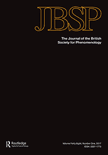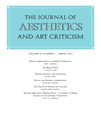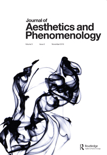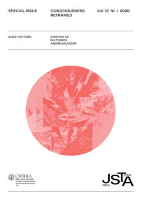
Rivista di Estetica
Scope & Guideline
Connecting Scholars through Open Access Aesthetic Research
Introduction
Aims and Scopes
- Philosophical Exploration of Aesthetics:
The journal delves into the philosophical underpinnings of aesthetics, engaging with historical and contemporary theories that shape our understanding of art, beauty, and sensory experience. - Ontology and Epistemology:
A significant focus is placed on ontological and epistemic questions, particularly concerning financial systems, ownership, and the nature of reality as it pertains to human experiences. - Social and Political Dimensions of Aesthetics:
The journal addresses the socio-political implications of aesthetics, examining how artistic practices and aesthetic experiences influence and reflect societal values and collective actions. - Interdisciplinary Approaches:
Rivista di Estetica promotes interdisciplinary dialogue, integrating insights from philosophy, sociology, economics, and cultural studies to enrich discussions surrounding aesthetics. - Emerging Media and Aesthetic Experience:
The journal explores new media and contemporary cultural phenomena, analyzing their aesthetic dimensions and their impact on human perception and social interaction.
Trending and Emerging
- Economic Aesthetics:
There is a growing interest in the intersection of aesthetics and economic theory, particularly concerning the ontology of money, financial systems, and the ethics of ownership, reflecting broader societal debates on capitalism and value. - Solidarity and Collective Action:
Themes of solidarity and collective action are increasingly prominent, emphasizing the ethical dimensions of community, justice, and social responsibility in aesthetic practices and philosophical discourse. - Phenomenology and Hyper-Reading:
The exploration of phenomenological approaches to reading and interpretation, particularly in the context of contemporary media, indicates a trend towards understanding how aesthetics shape and are shaped by human experience. - Environmental Aesthetics:
Recent discussions surrounding climate change and ecological responsibility suggest a burgeoning interest in environmental aesthetics, examining how art and philosophy can contribute to ecological awareness and action. - The Role of New Media:
The journal is increasingly addressing the aesthetics of new media, including television and digital art forms, reflecting the changing landscape of cultural production and consumption in contemporary society.
Declining or Waning
- Traditional Aesthetic Theories:
There seems to be a decline in discussions centered around classical aesthetic theories, such as those strictly adhering to the canon of Western art history, as the journal increasingly embraces contemporary and interdisciplinary perspectives. - Narrowly Defined Literary Criticism:
The focus on literary criticism, particularly in isolation from broader aesthetic discussions, appears to be waning, as the journal pivots towards more expansive themes that integrate philosophy with social and political contexts. - Static Representations of Art:
The exploration of art as a static entity, without consideration of its dynamic interactions within society and culture, has lessened, reflecting a broader trend towards understanding art as a participatory and relational experience. - Aesthetic Formalism:
The emphasis on formalist approaches to art analysis is declining, as the journal's recent publications prioritize context, meaning, and the socio-political implications of artistic practices over purely formal attributes.
Similar Journals

JOURNAL OF THE BRITISH SOCIETY FOR PHENOMENOLOGY
Advancing Phenomenological Inquiry Since 1970.JOURNAL OF THE BRITISH SOCIETY FOR PHENOMENOLOGY, published by JACKSON PUBLISHING & DISTRIBUTION, is a prestigious academic journal dedicated to the exploration and advancement of phenomenological philosophy. With an impressive 2023 Q1 ranking in the Philosophy category and a Scopus rank of #153/806 in the Arts and Humanities, this journal is a cornerstone for scholars seeking to delve into various facets of phenomenology, bridging theoretical insights with practical applications. Established in 1970, the journal encompasses a broad scope, highlighting both historical and contemporary perspectives within the field. Its commitment to intellectual rigor and engagement with phenomenological themes makes it an invaluable resource for researchers, students, and professionals alike. Despite not being open access, the journal offers a wealth of knowledge for those passionate about philosophical inquiry and the nuances of human experience.

JOURNAL OF AESTHETICS AND ART CRITICISM
Illuminating the Depths of Artistic ExpressionThe Journal of Aesthetics and Art Criticism, published by Oxford University Press, stands as a premier platform for scholarly discourse in the realms of music, philosophy, and the visual and performing arts. Established in 1996 and continuing through 2024, this journal has achieved remarkable recognition, being ranked in the Q1 category across several disciplines, and securing prestigious positions in various Scopus rankings: 29th in Music, 50th in Visual Arts and Performing Arts, and 151st in Philosophy, showcasing its essential contribution to arts and humanities scholarship. While not an open-access journal, its rich repository of articles offers invaluable insights for researchers, professionals, and students alike, fostering a deeper understanding of aesthetics and critical theory. The journal's commitment to interdisciplinary approaches opens pathways for innovative dialogue, making it an indispensable resource for anyone engaged in the study and appreciation of the arts.

Journal of Aesthetics and Phenomenology
Illuminating the Intersection of Art and ExistenceJournal of Aesthetics and Phenomenology, published by Routledge Journals, Taylor & Francis Ltd, is a significant resource within the field of philosophy, focusing specifically on the intricate relationship between aesthetics and phenomology. Since its inception in 2014, this journal has fostered critical dialogue among scholars, highlighting contemporary debates and innovative theoretical perspectives. With an ISSN of 2053-9320 and E-ISSN of 2053-9339, the journal offers a platform for researchers to contribute original articles that delve into the complexities of human experience and artistic expression. Although currently categorized in Q3 in Philosophy and positioned at Rank #630/806 in the Scopus rankings, it consistently attracts submissions from promising scholars eager to engage with its themes. While not an open access journal, it provides valuable insights into aesthetic theory and philosophy, appealing to students, researchers, and professionals alike, who are keen on exploring the nuances of these interrelated fields.

AM Journal of Art and Media Studies
Connecting Research with Creative Innovation.AM Journal of Art and Media Studies is a distinguished academic journal dedicated to the critical exploration of art and media in contemporary society. Published by SINGIDUNUM UNIVERSITY, FACULTY OF MEDIA & COMMUNICATIONS, this journal has been an Open Access platform since 2015, facilitating the dissemination of knowledge and fostering creativity for researchers, professionals, and students alike. With its ISSN 2217-9666 and E-ISSN 2406-1654, it aims to provide a rigorous peer-reviewed space for scholarly articles that illuminate the dynamic interplay between artistic expression and media technologies. Although specific impact metrics such as HIndex and Scopus rankings are currently unavailable, the journal aspires to contribute significantly to its field, encouraging innovative research in art and media studies. Its open access model ensures that valuable insights are readily accessible to a global audience, amplifying the impact of research and discussions surrounding cultural production in our increasingly mediated world.

FILOSOFICKY CASOPIS
Bridging Ideas: Where Philosophy Meets ReligionFilosoficky Casopis is a distinguished open-access journal dedicated to exploring the multifaceted dimensions of philosophy and religious studies. Published by the Institute of Philosophy in the Czech Republic, this journal aims to foster interdisciplinary dialogue and contribute to the evolving debates within these fields. With an ISSN of 0015-1831 and a publication history that spans converged years from 2002 to 2024, Filosoficky Casopis offers valuable insights into contemporary philosophical discourse. Despite its current standing in the Q4 quartile in the 2023 rankings for Religious Studies, the journal remains committed to elevating discussions and providing a platform for emerging scholarship. Since adopting an open-access model in 2021, it has expanded its reach and accessibility, ensuring that its content is readily available to researchers, professionals, and students alike. The journal's address is located at Jilska 1, Prague 110 00, Czech Republic, and it stands as a noteworthy publication for those interested in advancing their understanding of philosophical inquiry and its intersection with religious thought.

Esercizi Filosofici
Fostering Critical Reflection in Philosophical DiscourseEsercizi Filosofici, published by UNIV STUDI TRIESTE, DIPT FILOSOFIA, is an esteemed Open Access journal dedicated to the exploration and dissemination of philosophical thought since 2012. With an ISSN of 1970-0164, this journal serves as a vital platform for scholars, researchers, and students engaged in contemporary philosophical discourse. Its commitment to open access ensures that cutting-edge research and diverse philosophical perspectives are readily available to a global audience, fostering an inclusive academic community. By bridging theory and practical inquiry, Esercizi Filosofici aims to stimulate critical reflection and dialogue in the multifaceted field of philosophy, making it an essential resource for anyone seeking to deepen their understanding of philosophical inquiry and its implications in modern society.

Journal of Science and Technology of the Arts
Exploring the Fusion of Art and Science.The Journal of Science and Technology of the Arts, published by UNIV CATOLICA PORTUGUESA, is a pioneering open access journal dedicated to the interrelation of the arts and scientific advancements. Since its inception in 2009, it has served as a critical platform for disseminating innovative research across various disciplines, including Visual Arts, Performing Arts, Music, and Conservation. With its ISSN 1646-9798 and E-ISSN 2183-0088, the journal operates from Portugal, attracting a diverse international audience. Although it is currently ranked in Q4 for Arts and Humanities (miscellaneous) and Computer Science Applications, it has achieved notable Q3 rankings in Conservation, Music, and Visual Arts and Performing Arts as of 2023. The journal's impact is reflected in its Scopus rankings, which place it in the midst of its peers, showcasing its growing influence. Through its commitment to fostering interdisciplinary dialogue, the Journal of Science and Technology of the Arts is essential for researchers, professionals, and students interested in the innovative integration of arts and technology.

Sguardo-Rivista di Filosofia
Exploring the Intersection of Philosophy, Politics, and HistorySguardo-Rivista di Filosofia, published by EDIZIONI STORIA & LETTERATURA, serves as a significant forum for interdisciplinary discourse in the realms of philosophy, political science, and history. With the ISSN 2036-6558 and open access since 2010, this esteemed Italian journal fosters an inclusive academic environment, making its rich content widely accessible to researchers, professionals, and students alike. Although currently positioned in the Q4 quartile across various scholarly fields, including Philosophy and Political Science, it offers critical insights that encourage discourse and spark scholarly engagement. The journal's commitment to promoting innovative philosophical dialogue plays an essential role in shaping contemporary thought, making it a valuable resource for those pursuing advanced studies or conducting research in these domains. Join the growing community that values rigorous academic discussion through Sguardo-Rivista di Filosofia, where every article contributes to the evolution of contemporary philosophical and social inquiry.

Daimon-Revista Internacional de Filosofia
Advancing Global Philosophical DiscourseDaimon-Revista Internacional de Filosofia is a prominent academic journal published by Universidad de Murcia, dedicated to the field of philosophy. As an Open Access journal since 1989, it aims to democratize knowledge and ensure that philosophical discourse reaches a global audience, fostering a vibrant exchange of ideas among scholars, researchers, and students. With an impact factor reflected in its classification as Q2 in the 2023 Philosophy category, it ranks #441 out of 806 journals in the Scopus database, indicating a notable influence within the arts and humanities sector. Covering a diverse range of topics in philosophy, Daimon emphasizes original research and critical engagement, making it an essential resource for those looking to stay abreast of contemporary philosophical debates and advancements. Located in Spain, at the Edificio Pleiades, Campus de Espinardo, Murcia, the journal seeks to contribute to the ongoing conversation in philosophical thought, paralleling its convergence from 2011 to 2024 with emerging themes and trends in the discipline.

Open Philosophy
Redefining Boundaries in Philosophical Research.Open Philosophy, published by DE GRUYTER POLAND SP Z O O, is a premier open-access journal that has been fostering scholarly discourse in the realm of philosophy since its inception in 2018. Operating out of Germany, this journal has gained significant traction, now ranking in the Q2 category for philosophy with a commendable 80th percentile in Scopus, positioning it among the top 20% of journals in its field. With a dedicated focus on illuminating philosophical discourse, Open Philosophy provides a platform for innovative research and critical engagement, catering to the needs of researchers, professionals, and students alike. Its commitment to open access ensures that cutting-edge philosophical ideas are readily available to a global audience, contributing to the democratization of knowledge in the discipline. The journal's dimensions encompass a broad spectrum of topics within philosophy, seeking to expand theoretical frameworks and discussions from 2018 through to 2024 and beyond. Discover the transformative power of philosophical inquiry with Open Philosophy, where ideas flourish in an accessible and inclusive academic environment.